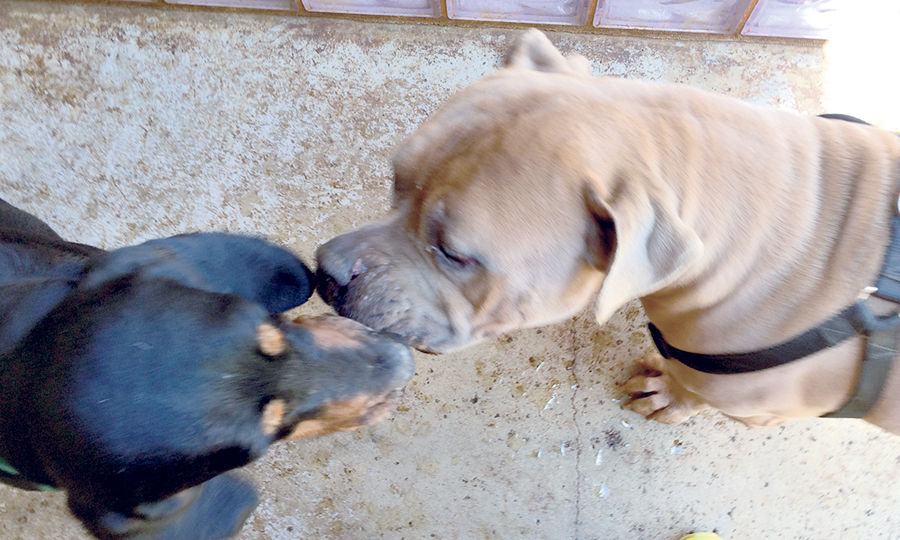LIHUE — The Kauai Humane Society has underreported the percentage of cats and dogs it euthanized for the last five fiscal years, a fact that has become the crux of a campaign launched by employees to oust the organization’s executive
LIHUE — The Kauai Humane Society has underreported the percentage of cats and dogs it euthanized for the last five fiscal years, a fact that has become the crux of a campaign launched by employees to oust the organization’s executive director.
The animal shelter took in 4,380 cats and dogs in 2014, according to KHS data. All told, 2,599 of them were euthanized, the data shows. When subtracting the 680 strays that were returned to their owners, that’s a euthanasia rate of 70 percent.
But, until now, KHS’s data indicated a much lower euthanasia rate of 52 percent.
“It was a math error, so it added an extra field on the spreadsheet that was erroneous,” said KHS Board of Directors President Emily Larocque. “This error had been in there for a number of years, actually. The current person who’s working with the spreadsheet inherited the incorrect calculation.”
Errors in the animal shelter’s self-reported data, particularly those related to euthanasia, are one of several complaints KHS employees went public with this week in an effort to compel the KHS Board of Directors to dismiss Executive Director Penny Cistaro from the organizations’ top job. A petition calling for Cistaro’s removal signed by a third of KHS’s employees was delivered to the board Wednesday. On that same day, the board unanimously reaffirmed its support for Cistaro’s leadership, creating a rift between the board and some of the organization’s staff.
Cistaro, who took the job a little over two years ago and referred questions on Thursday to the board, has said that the staffers who support her outweigh those who do not.
The numbers used to calculate KHS’s data on animal intake, adoption, euthanasia and the like come from PetPoint, the web-based data management system the shelter uses to self-report its animal care statistics. These hard numbers are then used by staff members to calculate percentages such as year-over-year percent change in animal intake and, in this case, the percentage of euthanized animals, which is wherein the mathematical errors were found.
The errors predate Cistaro’s employment with the organization.
Over the last five years KHS’s euthanasia rate has fluctuated by seven percentage points, hovering around 70 percent, the data shows.
But the errors painted a different picture. In 2013, when 68 percent of the animals under the care of KHS were euthanized, the shelter reported a euthanasia rate of 49 percent. While the real number of animals euthanized by KHS decreased from 2013 to 2014 by 7 percent, the percentage of animals euthanized when compared to the total number of animals in the organization’s care actually increased by 2 percent. That’s because KHS took in 360 fewer animals in 2014.
“The change in euthanasia numbers that we’ve been quoting on our website, which is a 7 percent decrease in euthanasia, are unaffected by the error,” Larocque said. “No matter how you calculate it, the trend is going down with euthanasia.”
The math errors were brought to the board’s attention on May 6 by community members. The board has since reviewed the numbers and will correct the data on the shelter’s website as soon as staff members complete a “quality check” for accuracy, Larocque said.
Basil Scott, president of the rescue group Kauai Community Cat Project, said the data errors should have been corrected weeks ago.
“I don’t know why they wouldn’t immediately correct their records,” he said. “I think they are perhaps embarrassed. It’s not like we’re talking about pi squared. We’re calculating very basic equations here. You can do this math on your cellphone. So why is it taking 20-something days and counting to update the numbers? My personal feeling is that if people didn’t pressure them, they would never release it.”
Scott also said the 7 percent decrease in euthanasia statistic that the board is toting is misleading.
“In 2014, 30 percent fewer animals left the Kauai Humane Society alive than they did in 2013,” Scott said. “That is a true statement. It is also completely unfair because they received 16 percent less animals in 2014 than they did in 2013, so to expect them to have the same number of animals alive is not right because there are fewer animals to begin with.
“But that’s what the 7 percent number does. Yes, it’s technically correct, but you know that saying that there are lies, there are damn lies and then there are statistics? This falls in that category in my opinion. This is a cherry picked statistic,” he added.


